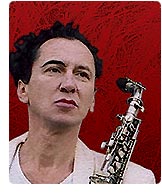 Ballads at the End Of Time
Ballads at the End Of Time
Boris Kovac Wakes Up After the Apocalypse and This is What He Finds
At first sight, the band’s name looks a little bit like the Dadaist answer to Lambada. But in fact the orchestra is named after the driven fantasies of bandleader, composer and multimedia-artist Boris Kovac when confronted with the grim reality of living and working in the war-ridden territory of the Balkan states. Written out in full the orchestra’s name actually means La Danza Apocalyptica Balcanica, a perfect match to their music: An eccentric cycle of dances like tango, waltz, calypso or rumba, played in the style of a syphilitic salon-orchestra, switching rapidly between the atmosphere of a decadent café in 1920s Vienna and the Titanic half an hour after every drink came with ice.
This month sees the release of Kovac’s Ballads at the End of Time (Piranha Musik), a sequel to last year’s The Last Balkan Tango. “This is the second and the last CD album of La Danza Apocalypsa Balanica Project,” proclaims Kovac. “I hope that such a theme will never inspire me again.”
Brought up in what was once the cosmopolitan and multicultural society of Novi Sad, capital of the multiethnic region of Vojvodina, Boris Kovac feels as if he is, in many ways, locked behind bars. La Danza Apocalyptica Balcanica is Kovac’s artistic answer to the pressures from both the internal political situation and the fact that his country is only slowly recovering from international pariah status—and he’s on a furious ride across the musical languages of the Balkan with only one thought in mind: Dance! Right here and right now, for it could be your last!
Boris Kovac, born in 1955, is a composer, instrumentalist and multimedia artist. He writes music for chamber groups that he leads. Many of his projects are to some extent connected with theatre. Since 1989, he has been the leader of the Chamber Theatre of Music Ogledalo from Novi Sad. During the period from 1991-1995, he mainly lived and worked in Italy, Slovenia, and Austria. In 1996, he moved back to Yugoslavia. By leading his Ritual Nova ensemble, LaDaABa orchest, Chamber Theatre of Music Ogledalo, Academy of Fine Skills, and working with students he is also trying to reestablish the contemporary music/theatre scene in his country. He has performed his works in around 30 festivals of new music and contemporary theater in many countries.
“Our advantage is, that people from 20 different nationalities lived together in the Pannonian plains,” Kovac explains. “So today no one can say from which folklore my music comes exactly. Anyway for us, living in an urban situation, having no contact to the little villages, it is not comprehensible where the music comes from. But I think that is not even necessary: decisive is, to use the sources as food for my own creativity.” The mixture of Boris’ music continues in the background of his band member’s lives: accordion, violin, bass and drums are played by Half-Serbians, Half-Hungarians and Half-Macedonians, the guitarist is Roma and the clarinetist a proper Serbian, but lived for several years in the Vojvodina and took over many musical techniques from the Hungarian and Romanian.
“Kovac slips easily across that twilight zone where contemporary composition and folk music touch.” — Chris Cutler, Resonance, London
|
|
 |
|
|